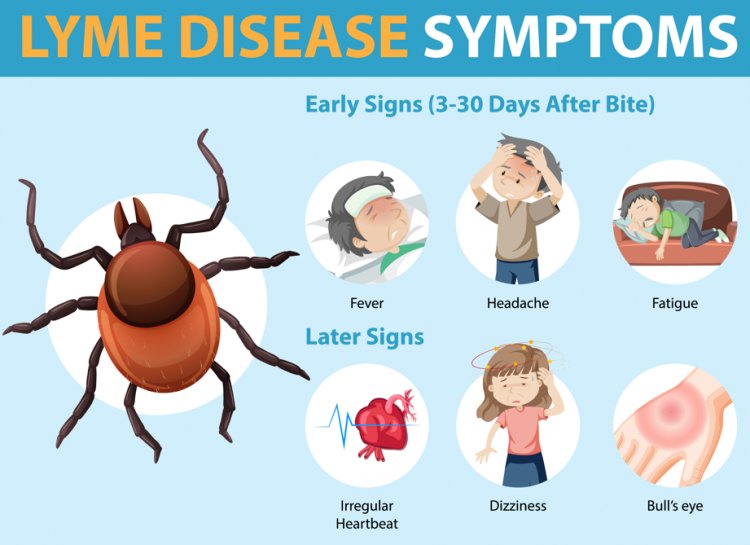Lyme Disease Demystified: Separating Fact from Fiction
Lyme disease is a tick-borne illness caused by the bacterium Borrelia burgdorferi. It was first identified in 1975 in Lyme, Connecticut, hence its name. Since then, cases have been reported worldwide, with varying prevalence depending on geographic location and environmental factors. This article provides an overview of Lyme disease, including its causes, symptoms, diagnosis, and treatment options.

Causes
Lyme disease is primarily transmitted to humans through the bite of infected black-legged ticks, also known as deer ticks. These ticks are commonly found in wooded and grassy areas, where they latch onto animals and humans for blood meals. When an infected tick bites a human, it can transmit the bacterium Borrelia burgdorferi into the bloodstream, leading to Lyme disease.
Symptoms
The symptoms of Lyme disease can vary widely and may mimic other conditions, making diagnosis challenging. In many cases, the characteristic early sign of Lyme disease is a red, expanding rash known as erythema migrans (EM), which often resembles a bull's-eye pattern. However, not all individuals with Lyme disease develop this rash.
Other common symptoms of Lyme disease include fever, chills, headache, fatigue, muscle and joint aches, and swollen lymph nodes. If left untreated, Lyme disease can progress to more severe symptoms, affecting the joints, heart, and nervous system.
Diagnosis
Diagnosing Lyme disease can be complex due to its diverse symptoms and the variability of diagnostic tests. Healthcare providers typically consider a combination of factors, including symptoms, medical history, and laboratory tests.
The most common diagnostic tests for Lyme disease include blood tests that detect antibodies against the bacterium Borrelia burgdorferi. These tests may include enzyme-linked immunosorbent assay (ELISA) and Western blot tests. However, it's important to note that false-negative results can occur, particularly in the early stages of infection.
Treatment
Early diagnosis and treatment are crucial for effectively managing Lyme disease and preventing complications. The primary treatment for Lyme disease is antibiotics, such as doxycycline, amoxicillin, or cefuroxime. The choice of antibiotic and duration of treatment may vary depending on the stage of the disease and individual factors.
For individuals with early-stage Lyme disease, oral antibiotics are often sufficient. However, for those with more advanced or persistent symptoms, intravenous antibiotics may be necessary. In addition to antibiotics, symptomatic treatment may be recommended to alleviate specific symptoms such as pain, fever, and inflammation.
Prevention
Preventing Lyme disease primarily involves avoiding tick bites and reducing exposure to tick-infested areas. This can be achieved by wearing long sleeves and pants, using insect repellents containing DEET or permethrin, performing thorough tick checks after outdoor activities, and promptly removing any attached ticks with tweezers.
Furthermore, landscaping measures such as maintaining a tidy yard, removing leaf litter and brush, and creating barriers to prevent deer and rodents can help reduce the risk of tick encounters.
In conclusion, Lyme disease is a significant public health concern, particularly in regions where infected ticks are prevalent. By understanding the causes, symptoms, diagnosis, and treatment options for Lyme disease, individuals can take proactive measures to protect themselves from tick bites and seek timely medical care if needed. Continued research into Lyme disease prevention, diagnosis, and treatment is essential for effectively combating this complex illness.
#LymeDisease #TickBorneIllness #BorreliaBurgdorferi #DeerTickBite #ErythemaMigrans #LymeDiagnosis #AntibioticTreatment #TickPreventionTips #LymeAwareness #HealthcareAwareness
Disclaimer:
The information provided in this article is for educational purposes only and should not be considered medical advice. If you have any health concerns or are experiencing symptoms, it is important to consult with a healthcare professional, such as a doctor or clinic, for proper diagnosis and treatment. Always seek the advice of your doctor or other qualified health provider with any questions you may have regarding a medical condition. Do not disregard professional medical advice or delay in seeking it because of something you have read in this article.
What's Your Reaction?





















